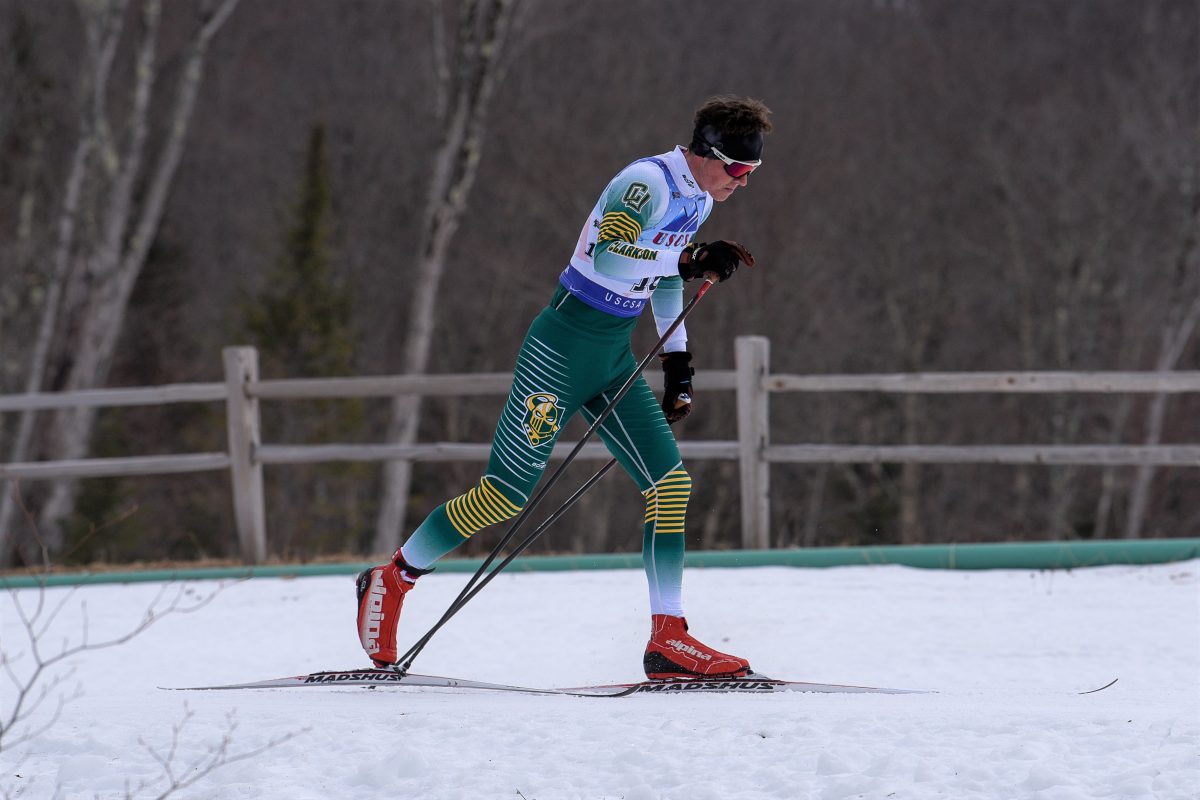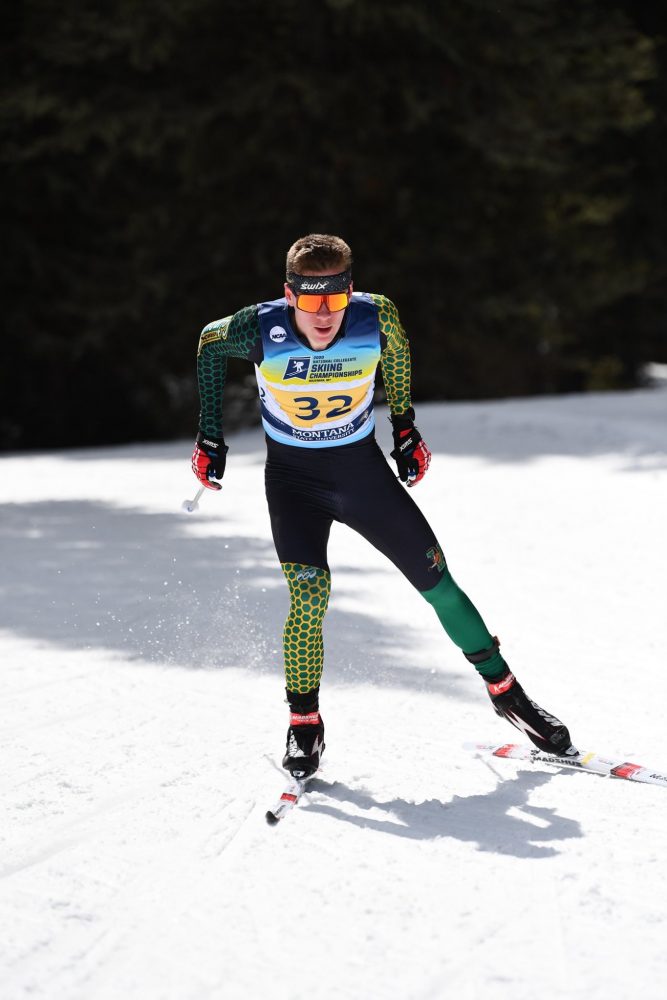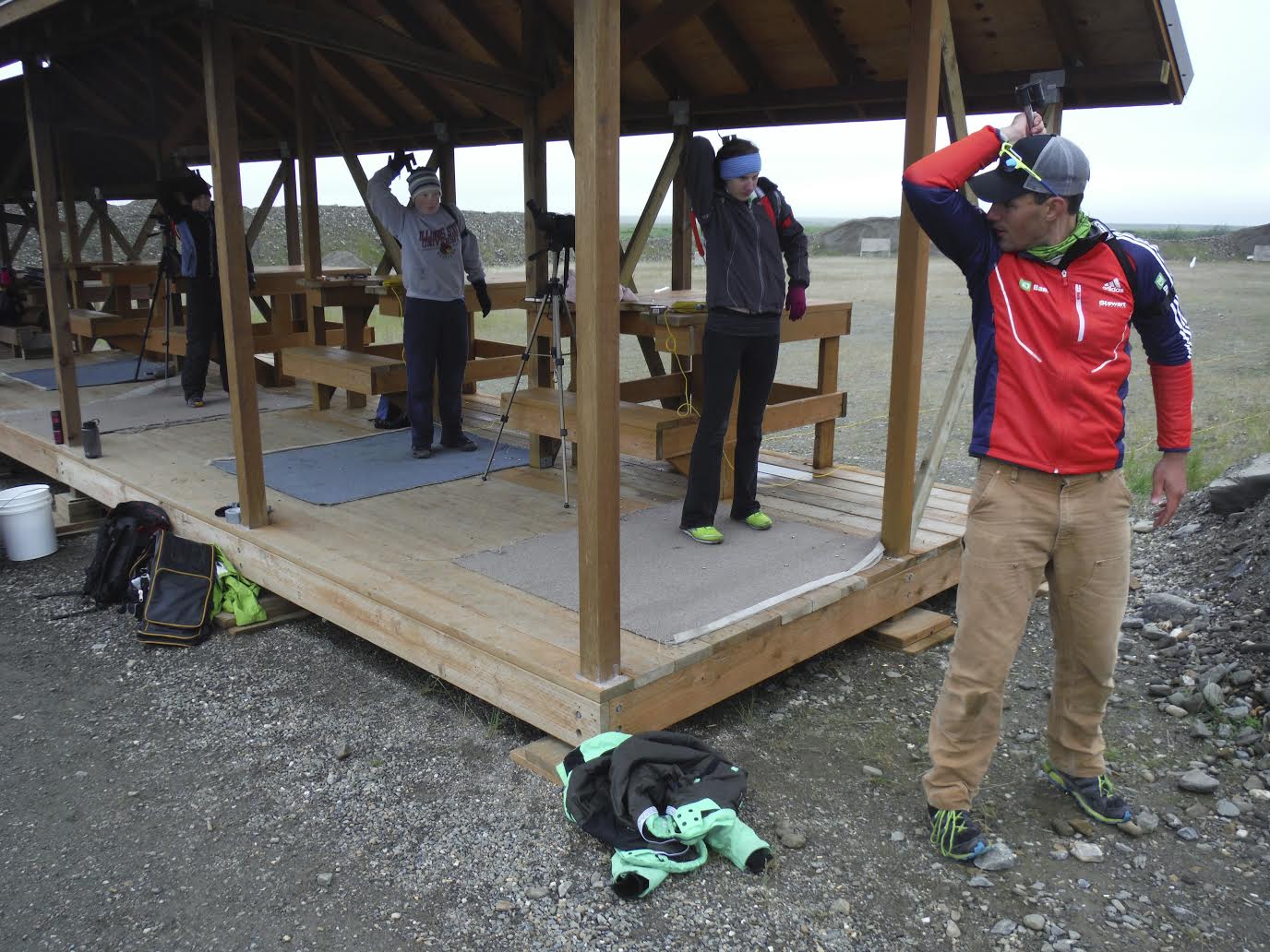
In recent years the U.S. Biathlon Association offers a coaching internship with the national team. It can be a springboard for a career in nordic sport: last year’s intern, Erik Lewish, is now an assistant coach with the team.
This year the spot went to Sam Dougherty, a former junior biathlete who recently graduated from Montana State University.
In the long run, Dougherty wants to have a career in management and administration. He studies business at MSU. But for now, he wants to take that approach with biathlon, the sport he has been passionate about for so long.
“I want to immerse myself in every facet of programming at every level across the nation in order to have a non-condescending finger on the pulse of biathlon,” Dougherty wrote in an email interview. “In business school I was surrounded by incredibly gifted people who are hell-bent on changing the vocabulary of their field of interest. I want to be that kind of person for biathlon and the greater American nordic community.”
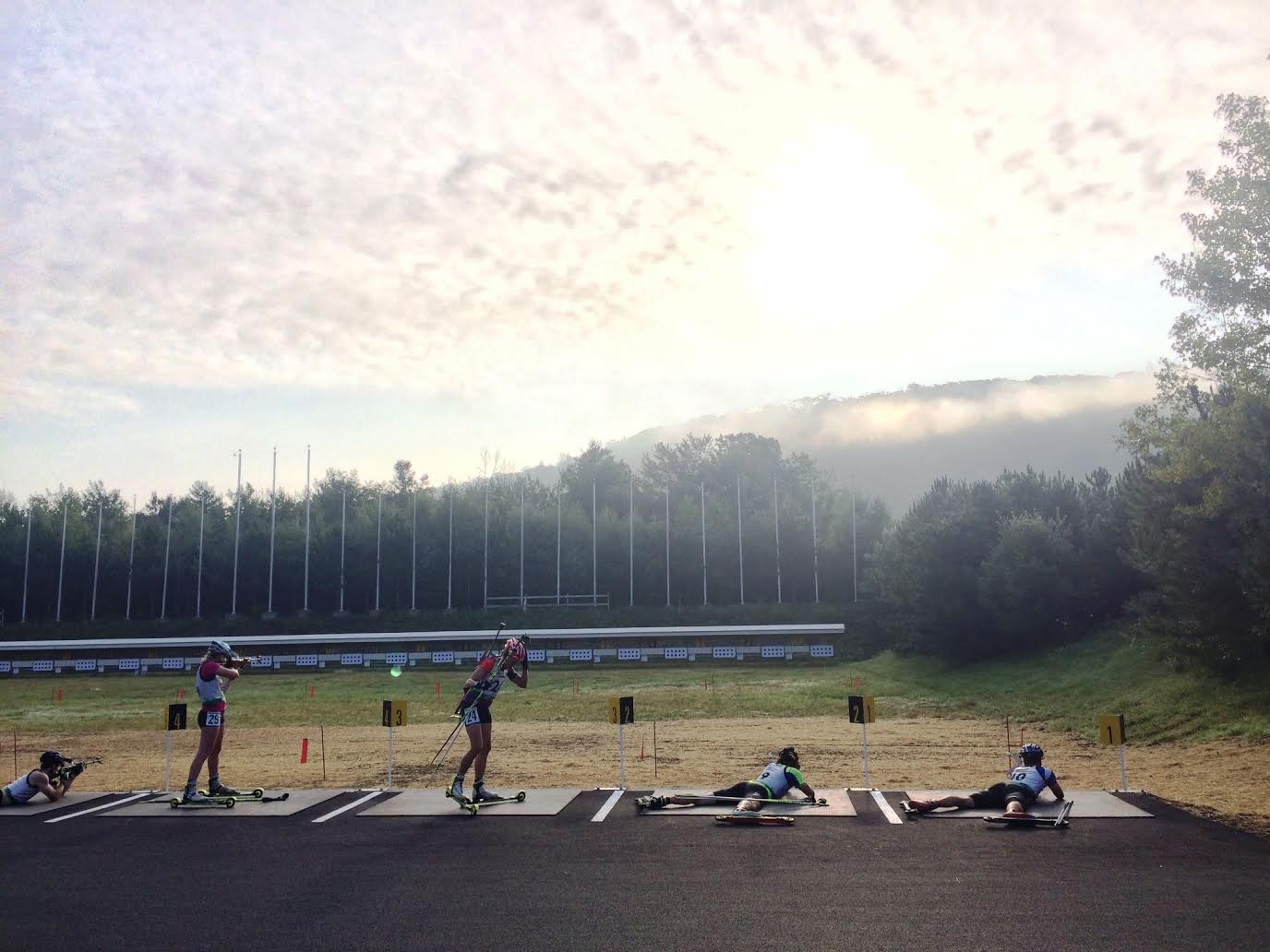
In the meantime, he based himself in Lake Placid with the national team and has been involved in every aspect of training. Dougherty said that he had filled two notebooks already with coaching notes.
That’s impressive considering Dougherty’s previous involvement in coaching and management. although he’s 22 years old, he has been coaching for a while – partly because the biathlon community is small and coaches and range help are always needed, even from the current pool of athletes.
So Dougherty has worked with elementary schoolers, high shoolers, and masters athletes. That includes as a village coaching director for NANA Nordic (now called Skiku) and as a program head and coach for 75 biathletes at the Nordic Skiing Association of Anchorage.
And he earned more practical experience a few years ago when he tried to start up a training group and team for elite junior biathletes who were attending MSU. Four or five serious college-age athletes gave it ago, but the effort came apart after most left the sport.
After competing as a skier for the first part of his time in Bozeman, Dougherty transitioned to managing the MSU Ski Team his senior year. That meant learning under the guidance of Kristina Trygstad-Saari, who coached the team last year, and Tim Whiton, who was her assistant.
Here’s how Dougherty aims to get the most out of his internship experience, while also giving the mot to U.S. Biathlon’s athletes and staff. His organizational and managerial philosophy, as well as his background as an athlete, are why he was picked for the position. “I try to remind myself of a version of this every day,” Dougherty wrote in an email.
Communicate: Know the plan, explain the plan, execute the plan.
Be a Sponge: Never stop learning and absorbing. Be a derivative of your mentors
Mold my Style A’ la Carte: Take what qualities I like from all of my mentors, and build a model coach from those qualities.
Respect the Totem Pole: I deserve to be at the bottom. How do I make myself invaluable?
Be The Best at What You Do, then Do It Better: Is “Business as Usual” the most efficient and cost-effective?
Always Think 4 Weeks Ahead: Where are we going and why?
Control What You Can, Respect What You Can’t: Make sure athletes are in a place that they feel well but still ask for performance. In return ask for self-motivation.
“I’ve done my best to receive as much formal training in coaching as possible,” Dougherty explained. “US Biathlon has a tier-level coaching certification program, much along the lines of USSA. I received my Level 1 coaching certification in 2012… I also took a semester-long sports coaching class at Montana State, which gave me a basic understanding of exercise physiology, nutrition, planning, and mediation.”
Many of the national team staff he’s now working with come from European countries which have a more formalized coaching education system, like Sweden, Finland, and Germany. He’s hoping to absorb their knowledge.
“I definitely see a difference in my style of coaching compared to the National Team coaches [from] Europe,” he wrote. “A lot of it is in their confidence and experience, and it’s something I hope to emulate by the time I’m their age. I think a more formal education in coaching can prepare a person for success a lot sooner in their career and take a lot of the guesswork out of their approach for the first few years.”
With Jonne Kahkonen and Jean Paquet as his main mentors, Dougherty has been working mainly with the women’s “A” team, although he also works with other athletes. He does whatever is necessary, which encompasses a wide range of tasks.
“I’m an excellent van driver,” he wrote.
That sounds like a joke about the typical internship experience. However, Dougherty is not just relegated to managerial tasks, he also helps out on the range and is learning more about physiology, which he considers his biggest weakness as a coach at the moment.
“I am responsible for timing, scoring, and recording every shot our athletes make,” Dougherty explained. “I then put the information into a database that our coaches and athletes can analyze for progress and trends. Every round our athletes fire has a reason. I feel that’s unique to this team.”
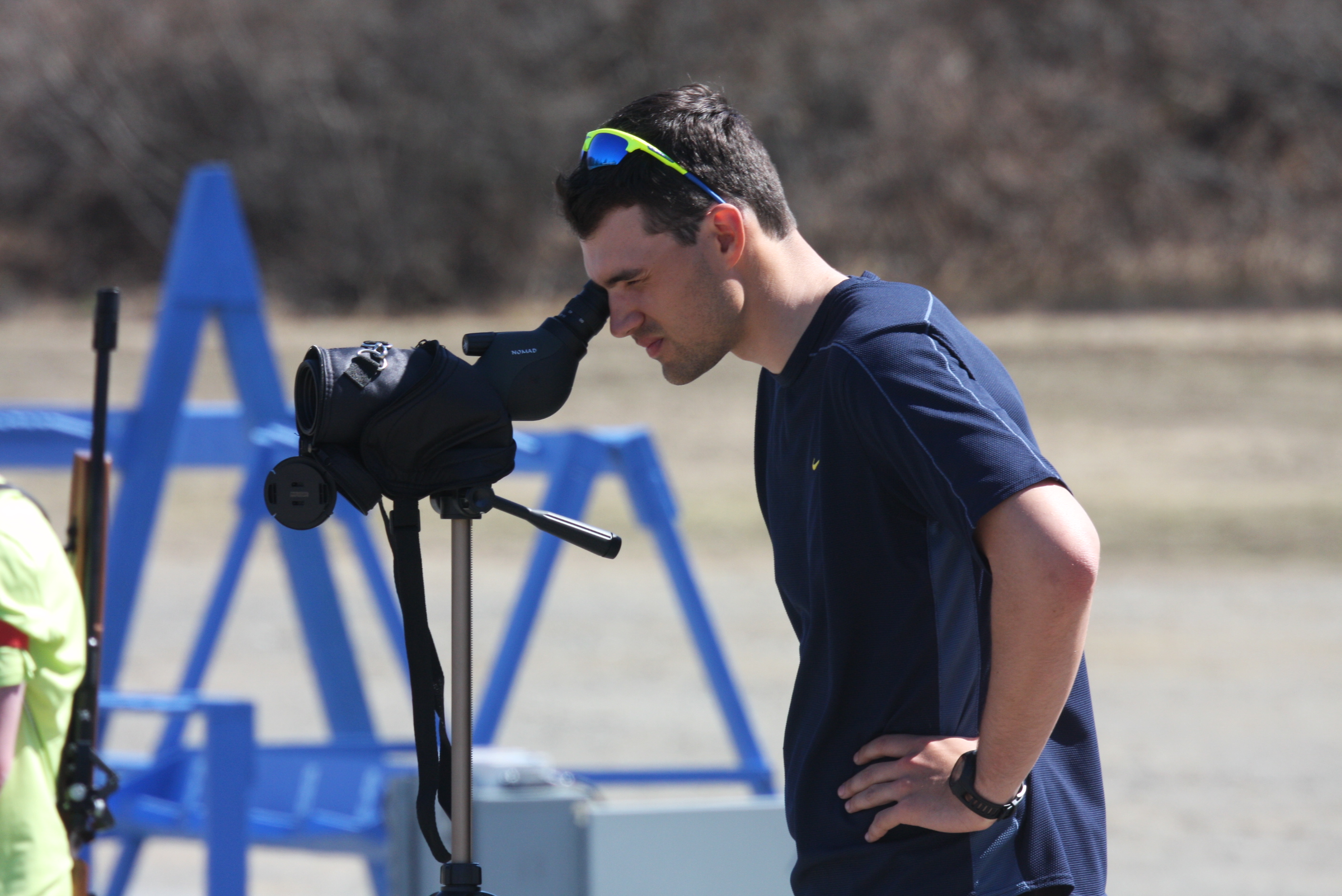
That means managing the shots for athletes like World Championships medalist Tim Burke, World Cup podium finisher Lowell Bailey, World Junior Champion Sean Doherty, and American recordbreaker Susan Dunklee, and the rest of the team’s big names.
“I’m still really star struck when I look down the scope for these guys,” Dougherty wrote. “I still have posters of them on my wall in Alaska. The biggest unknown for me going in was how I could assist in the development of athletes 10 years my senior that have achieved more success than I could’ve ever imagined in my own biathlon career.”
But he is having an effect. Kahkonen wrote that Dougherty has quickly earned the respect of the athletes with his hard work.
“Sam stood out [from other applicants] with his overall approach to it and his former career as a biathlete,” Kakkonen wrote in an email. “Now having Sam and working with him am I really happy that we selected him. He has a very good, calm approach to coaching and has a very open mind to keep learning as we go.
Sam has been getting along really well both with the staff and more importantly with the athletes; he has the respect through his actions at training.”
As the summer has worn on, Dougherty has been trusted with more responsibility.
“More recently I have been given the opportunity to work one-on-one with the athletes, and even run some of the training on my own,” he explained.
And when more bodies are needed, Dougherty relies on his own experience as a top-30 World Juniors finisher several years ago.
“It’s also nice to know I’m capable of jumping into a shooting drill every so often,” he wrote.
He’s now looking forward to the future. The internship will end on November 1.
“I’ve been in contact with a few programs that may have a place for me after my internship is done, and I’m still looking to see what is out there for biathlon and Nordic management and coaching,” he wrote. “Wherever I decide to go I hope to positively impact the overall athlete experience… As an athlete I wanted to be the best. Once I started coaching, I realized that it was just as rewarding for me, and maybe all along I just wanted the team and the program to be the best.”
And although coaching national-team athletes might seem a bit different than some of the other options open to a young coach, Dougherty has learned plenty that he hopes to take to another job.
“At the national team level, athletes are much more involved in the planning and execution of their personal training plan,” he explained. “It’s much more collaborative. At this level it’s more about removing obstacles for the athletes than enforcing a universal training plan. It’s something I would incorporate if I coached a collegiate team in the future.”
Chelsea Little
Chelsea Little is FasterSkier's Editor-At-Large. A former racer at Ford Sayre, Dartmouth College and the Craftsbury Green Racing Project, she is a PhD candidate in aquatic ecology in the @Altermatt_lab at Eawag, the Swiss Federal Institute of Aquatic Science and Technology in Zurich, Switzerland. You can follow her on twitter @ChelskiLittle.


